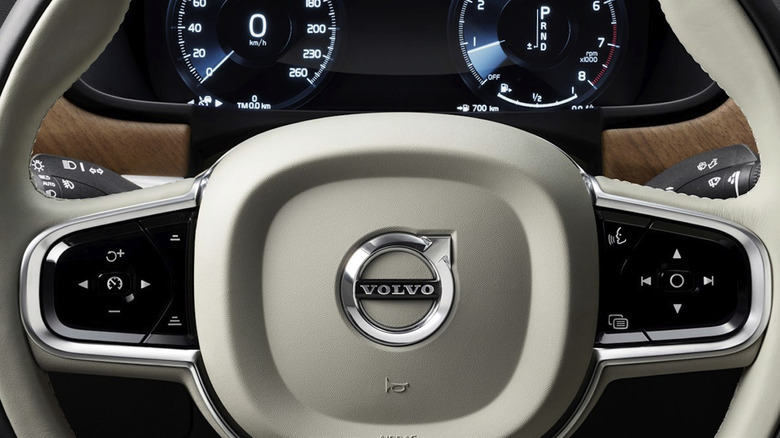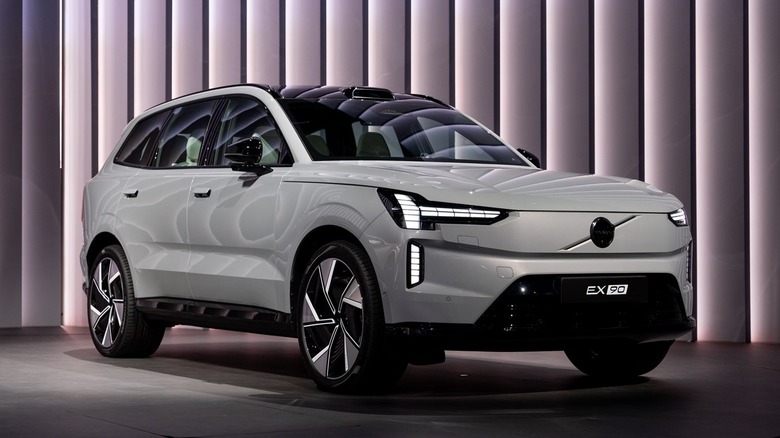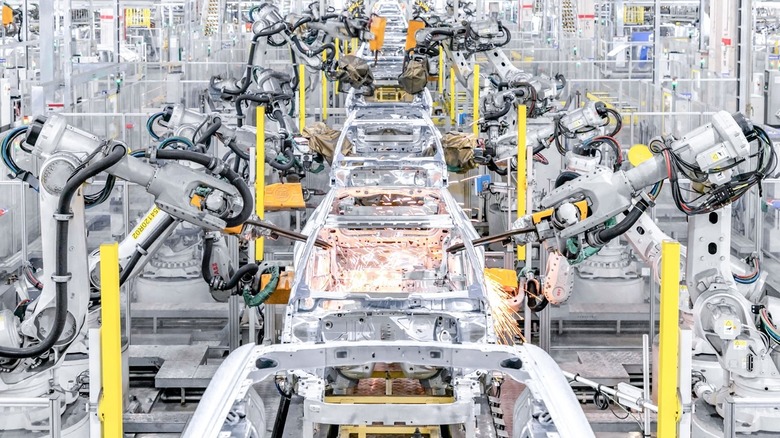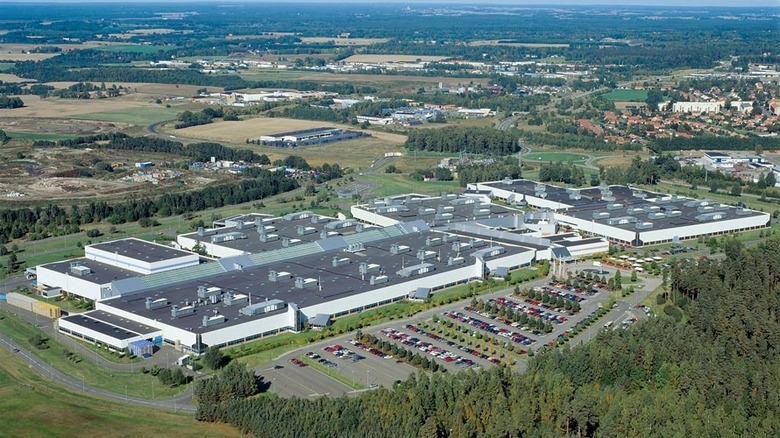Who Makes Volvo Cars And Where Are They Built?
With origins in Gothenburg, Sweden, Volvo has had almost a hundred years of car-making history under its belt. In 1927, Volvo revealed its first vehicle, the four-cylinder ÖV4 car, but it took almost 20 years before it launched the PV 444 or "little Volvo," which signified its place on the international stage in 1944. While it took another decade before the PV 444 graced United States soil in 1955, American drivers quickly became (and are still) its most important market outside of Europe.
Through the years, Volvo has made a reputation for itself as an innovative and reliable manufacturer. In the past, Volvo and one of its designers, Nils Bohlin, famously decided not to patent the first three-point seat belt system to allow other manufacturers to provide the safest possible seat belt option. Initially, it was used by the Volvo PV 544 and the Amazon 120, but now it is ubiquitous across vehicle manufacturers everywhere.
Since then, Volvo has been sold in 100 countries by a network of global dealers and with thousands of employees across multiple continents. Here at SlashGear, Volvo and its portfolio of vehicles have joined several of our top lists, especially with its smaller vehicles that could pack a punch. For example, its cars have joined our lists for practical cars that you can consider instead of SUVs and small car engines with impressive horsepower output. But who makes the renowned car brand today (and is it really still European)?
Who makes Volvo?
Before we get into manufacturing locations, it's important to know that Volvo's ownership as a company has changed hands a few times in the last quarter century. Although it remained independent for a large part of its history, it was acquired by the American-led Ford Motor Company at the cusp of the 2000s. BBC News shared that Ford won its bid against Volvo's fellow European automakers, Volkswagen and Fiat, and paid a whopping $6.5 billion price tag to add Volvo to its portfolio, joining the likes of other premier vehicle brands at the time, including Jaguar, Land Rover, and Aston Martin.
Unfortunately, Ford wasn't able to bring Volvo and its other acquisitions to their highest potential. With the onslaught of the 2008 financial crisis and mounting financial troubles, WIRED revealed that Ford offloaded Aston Martin for under a billion dollars in 2007. A year later, Ford sold Jaguar and Range Rover to Tata Motors for less than half of what it paid for them, according to ABC News. By 2010, the New York Times reported how the Volvo Cars brand sold for less than 30% of what Ford originally paid, a dismal $1.8 billion, to Chinese conglomerate, Zhejiang Geely Holding Group (Geely).
Although Geely has a much shorter history as a car manufacturer, which it only started doing in 1997, Geely Holding is a Fortune Global 500 company that has been around since 1986. Apart from Volvo, Geely has acquired other global automotive brands like Lotus and Lynk & Co.
Where are Volvo cars made?
While in 2010 it was sold to Geely Holding, making Volvo one of the many car brands owned by Chinese companies, Volvo Cars is now a publicly listed company on the Swedish NASDAQ. Geely is the majority shareholder. Volvo Cars is headquartered in Gothenburn, Sweden, and as of 2024, the company shares that its vehicles are made in Belgium, China, the United States, and of course, Sweden.
Since 2017, the car manufacturer has done everything from the paint shop, battery assembly, to final assembly in its South Carolina plant. Some popular models that Americans will be proud to say were built in the region are the fully electric EX90, the hybrid S60, and the S60, although, the S60 was recently discontinued. However, if you're still eager to get a bite of the renowned European craftsmanship, some models sold in the United States — including the XC60, XC90, and the V90 Cross Country — are still produced in Volvo's Sweden factory.
On the other hand, Volvo's Belgium factory in Ghent makes the XC40, XC40 Recharge, V60 Cross Country, C40 Recharge, and the upcoming EX30. That said, Reuters has reported how the Ghent factory production has been encountering problems due to security issues in recent times. Lastly, Volvo's three factories in China (Daqing, Chengdu, and Taizhou) have built the S90, S90L, S60, XC60, EX30, EX90, XC40, and XC40 Recharge, but these vehicles are primarily manufactured to sell in the Asian market.
Why does it matter where Volvo cars are made?
In the age of globalization, it's standard practice for companies to outsource materials and manufacturing to other countries. Since Volvo has been in the game for decades, it has pretty much nailed the knowledge transfer procedures necessary to maintain quality. However, there are still plenty of reasons why it could matter to you where your Volvo is made.
Where the company is primarily based can impact things like government support, which can affect the prioritization of research and development. For example, China has spent over $200 billion in aid for EV makers, which includes benefits like sales tax exemptions, infrastructure budget, and R&D support, according to Bloomberg. Apart from other incentives, it's unsurprising that Volvo has already made a commitment to going fully electric soon. Since it made its announcement, Volvo has also made strides in different aspects of EV technology, including a faster charging battery and supporting Tesla's charging U.S. plugs.
Not to mention, as we've seen with the issues some of the European plants are experiencing due to conflicts at the Red Sea, the stability of operations can affect things like production schedules and delivery times. And of course, there's still some sort of pride to supporting businesses that do make use of American hands and talent. Given how one of its latest EV stars, the 2025 Volvo EX90 will be built in the South Carolina plant, there's a lot to be excited about for the future of Volvo electric vehicles.



